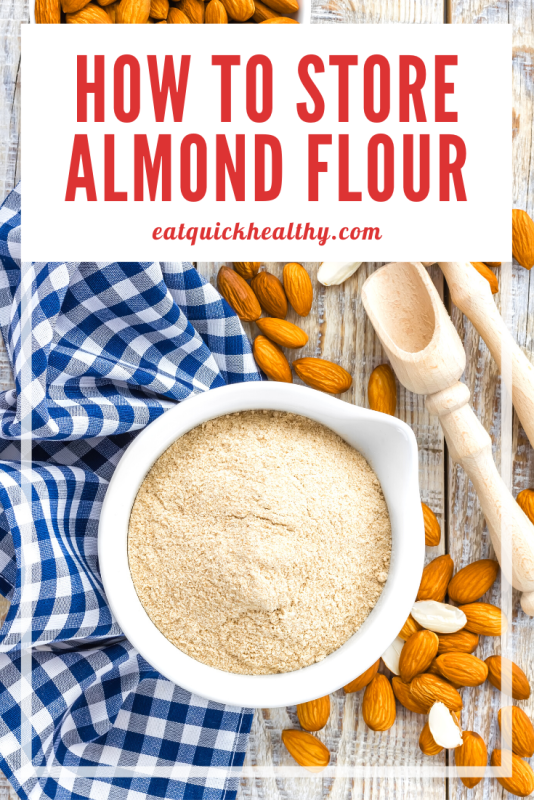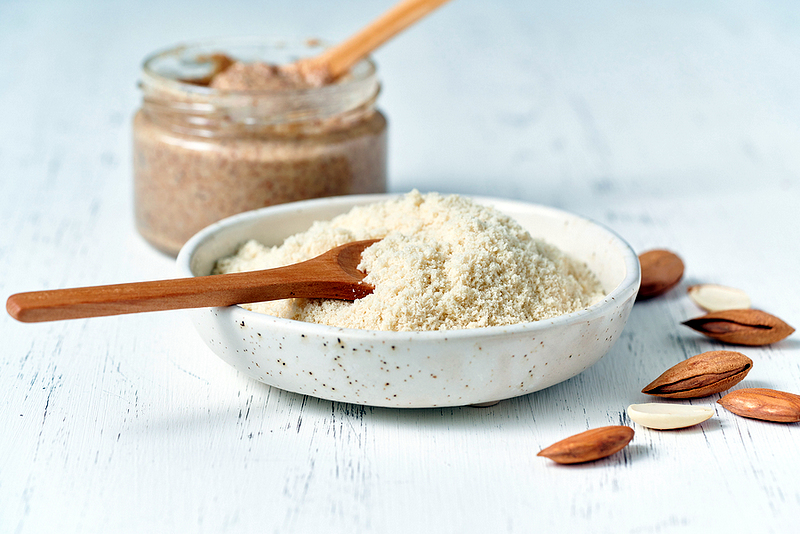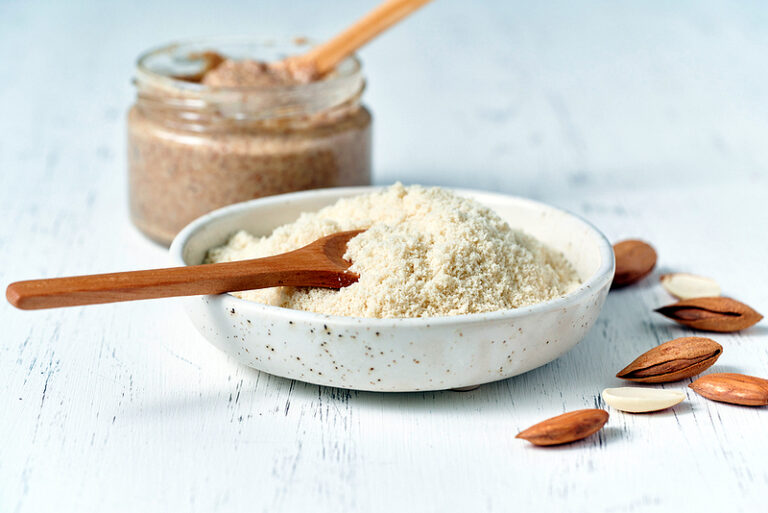Love almond flour? Want to know how to store almond flour correctly so it lasts as long as possible? Do you even need to worry? Does almond flour go bad?
I’ve got all the answers to these questions and more below.
Almond flour is a useful nutritious alternative to regular flour that is gluten-free, works in paleo diets, and can work great in cooking. However, if you are new to almond flour, or just found some at the back of your cupboard, you may be wondering if it can go bad or how to store it.
I know I used to wonder about all these things!
In this guide, I walk you through exactly what almond flour is, whether it can go bad (and how you can tell), exactly how to store almond flour for the best results, and how long almond flour lasts.
Let’s start!

What Is Almond Flour?
Almond flour is made solely from almonds and is a useful alternative flour for people who are gluten-free, follow a paleo diet, or anyone who wants to use a more nutritious flour or loves the taste of almonds.
The flour itself is made by soaking almonds in boiling water to remove the skins. The almonds are then dried and ground until they form a flour with the desired texture.
Almond flour is an off-white/very pale brown color and has a nutty, almond taste. In baking, it can taste like toasted almonds. Yum!
Almonds are full of heart-healthy fats and proteins and so is the flour. This can give extra moisture when cooking with it which can be ideal for muffins and brownies. Products made with almond flour are denser than those with regular flour, however.
If you are wondering about almond meal, this is very similar to almond flour as it’s also made with ground almonds. The difference is that the skin is not removed from the almonds first so almond meal is a different color, and texture and has a different taste compared to almond flour.
It’s a darker brown, is coarser, and can have a bitter taste. This means almond flour and meal are not directly interchangeable unless you don’t mind the different results you’ll get cooking with almond meal.

Does Almond Flour Go Bad?
Yes, almond flour can go bad.
Because almond flour contains oils, it can go rancid. This can happen when the almond flour is exposed to light, moisture, or heat. Storing your almond flour so that it can’t be exposed to these things can help it last longer.
How can you tell if your almond flour has gone bad? Simply, do the following looking for anything unusual.
Step 1: Examine The Almond Flour
Start by looking at your almond flour for anything unusual. Some things to particularly look for:
- Is the packaging damaged? If there’s any sign of water damage, I would toss it out.
- Has the color changed? If it has, toss it out.
- Is there any clumping in the flour? If there is, but no mold, you can sift the flour and see if it still looks ok to use.
- Is there any mold? If so, toss it out.
- Are there any signs of insects living in the flour? If so, toss it out.
Basically, if there is anything out of the ordinary, I would throw out the almond flour.
Step 2: Smell The Almond Flour
If the almond flour passes the visual examination, it’s time for the sniff test. Simply sniff the almond flour and look for anything unusual.
Almond flour should smell like almonds which is a nutty smell.
If you smell anything:
- Sour
- Off
- Like old wood
I would throw out the almond flour.
How To Store Almond Flour
When it comes to how to store almond flour, it’s all about protecting the almond flour from the things that make it go bad. This is light, moisture, and heat. All these things can be addressed by the following recommendations.
First of all, I recommend you don’t open your almond flour for as long as possible and keep it in its original wrapping. The longer it is unopened, the longer it will last.
How To Store Almond Flour After Opening
Once you open it, transfer it to an airtight container.
You then have multiple options when wondering how you store almond flour.
Option 1: Store Almond Flour In The Pantry
It is fine to store almond flour in a dark, cool pantry. This is especially recommended if your almond flour is unopened. The darker your pantry, the better.
An exception to this is if you live in a hot/humid climate. Then it can make sense to always keep your almond flour in the refrigerator.
Once you open your flour, it’s important it’s kept in an airtight container not just to keep out moisture, but also because insects that like to prey on pantry food can especially like food like almond flour with its high oil content.
Option 2: Store Almond Flour In The Refrigerator
This can be the best way to store almond flour, and I recommend it once you open your flour. It will protect your flour from light and heat and help it last longer. It’ll also protect it from any insects and bugs who might like to live in your almond flour.
It is important that your flour is in an airtight container before moving it to the fridge. This is because the cooler temperatures in the fridge can bring moisture into your flour causing it to clump and possibly start growing mold. A fully sealed container will help prevent this.
Option 3: Store Almond Flour In The Freezer
Finally, if you want your almond flour to last as long as possible, you can’t beat the freezer. The cold temperatures can help your almond flour last for years!
Almond flour is generally fine to freeze, but it doesn’t hurt to test it out first by freezing a small amount, defrosting it, and checking it’s the quality you expect.
I recommend wrapping your flour in smaller portions in freezer bags so you can pull out and defrost just the amount you need when it comes time to use it. Double wrapping with two freezer bags can help fully protect it and help minimize any changes in texture with your almond flour.
Defrosting Almond Flour
When you want to use some almond flour, take it out of the freezer and let it defrost at room temperature. Don’t use it until it is fully defrosted for the best quality almond flour.
How Long Does Almond Flour Last?
How long almond flour lasts depends on a few things:
- Is it homemade?
- Is it opened?
- How is it stored?
The longer you can keep bought almond flour unopened, the longer it will last. So only open it when you need to.
Next, how long it will last depends on which option you chose to store it. For example, an unopened bag in the pantry can last 2 – 4 months after its best-before date. In the freezer, it can last 12-24 months.
It’s worth remembering that a best-before date is simply that – the date that manufacturers believe their products are best before. It doesn’t mean the product isn’t safe to use afterward.
In the table below, you can find how long your almond flour can generally last past its best-before date depending on how it is stored.
| Almond Flour Is Stored In The… | The Almond Flour Lasts… |
| Pantry (Unopened bag) | Best before date + 2-4 months |
| Pantry (Opened bag) | Best before date |
| Refrigerator (Unopened bag) | Best before date + 6-12 months |
| Refrigerator (Opened bag) | Best before date + 3-6 months |
| Freezer | Best before date + 12-24 months |
Homemade almond flour is not likely to last as long. It has no additives or preservatives. I recommend using almond flour within three months in the pantry or six months in the refrigerator. In the freezer, there should be little difference in how long it can last.
Read our full guide to how long almond flour lasts here.
FAQs
Should almond flour be refrigerated or frozen?
While almond flour does not require refrigeration or freezing, storing it in the refrigerator or freezer can help prolong its shelf life. The cool temperatures of the refrigerator or freezer help to maintain the freshness and prevent the almond flour from going rancid.
How long does almond flour last?
When stored properly, almond flour can last for about 6 to 12 months. However, its shelf life can vary depending on various factors such as the packaging, storage conditions, and the initial quality of the almond flour.
Does almond flour go bad?
Yes, almond flour can go bad if not stored properly or if it is past its expiration date. Over time, almond flour can become rancid due to the natural oils present in the almonds. Rancid almond flour will have an unpleasant odor and taste.
How can I tell if almond flour has gone bad?
To check if almond flour has gone bad, look for signs such as a rancid or off smell, a bitter or sour taste, or a change in color. If the almond flour has developed a strange odor or taste, it’s best to discard it.
Can I use almond flour after its expiration date?
It’s generally recommended to adhere to the expiration date on the packaging. However, if the almond flour has been stored properly and shows no signs of spoilage, it may still be safe to use. Use your judgment and consider the quality of the almond flour before using it past its expiration date.
Should I sift almond flour before using it?
Sifting almond flour before using it can help break up any lumps and ensure a smoother texture in your recipes. It also helps to incorporate air into the flour, making it lighter and more suitable for baking.
Conclusion
I hope you found this guide to how to store almond flour keep useful! Almond flour is a great ingredient to keep in the pantry (or refrigerator!) and storing it correctly can lead to it lasting a long time.
Storing almond flour correctly is the best way to stop it from going bad and make sure you can use it as long as possible. As a starting point, you should not open the almond flour for as long as possible, and, once opened, you should store it in an airtight container, preferably in the fridge.
You can find our guide to almond flour vs regular flour here, almond flour vs cashew flour here, or find all our guides to everything almonds here.



Comments are closed.